Real answers to frequent Equipment questions
Prices, financing, multi-brand comparisons and more.
-
If you’re tackling a construction project, landscaping endeavor, or home improvement task in Jupiter, Florida, Jason Rents offers a comprehensive selection of rental equipment to meet your needs. With over 30 years of experience, they provide reliable tools and machinery…
-
Equipment Rental Activities
This section provides a comprehensive overview of the activities people perform when renting equipment from rental stores, focusing on skid steer loaders, mini excavators, aerators, chainsaws, concrete saws, and portable AC units. The information is derived from various sources, including…
-
When Does It Make Sense to Buy New Equipment vs. Used?
Buying heavy equipment, whether for construction, agriculture, or industrial use, is a major investment. One of the most common questions buyers ask is: “Should I buy new or used?” The answer isn’t always straightforward. It depends on several factors, including…
-
What is Weight Capacity, and How Is It Calculated?
Weight capacity refers to the maximum load a trailer or dolly can safely carry, and it’s determined by several factors: Tip: Always follow the manufacturer’s rated capacity and never exceed it—even if the trailer looks like it can take more.…
-
Why Your Horse Facility Needs the Right Trailers
Managing a horse facility efficiently requires the right equipment, and one of the most valuable assets is a set of well-suited trailers. From moving jumps and poles to handling farm materials such as hay, feed, and fencing, having the proper…
-
How to carry heavy materials in landscaping and hardscaping jobsites without damaging the ground
Introduction: In the landscaping and hardscaping industries, using the right tools is crucial for efficiently mobilizing materials while preserving the integrity of delicate surfaces. Landscapers often face the challenge of navigating tight gates and protecting expensive flooring, such as pool…
-
The Importance of Efficient Material Handling in Warehouses and Food Production Facilities
In today’s fast-paced world, efficient material handling is crucial for warehouses and food production facilities. Proper handling not only ensures efficiency but also safeguards workers and product quality. Challenges in Material Handling Moving heavy and bulky loads poses significant challenges.…
-
How to pick the right kind of hand truck or dolly
The Essential Role of Hand Trucks and DolliesHand trucks and dollies are indispensable tools in both construction and landscaping industries. Their versatility and efficiency make them a staple for moving heavy materials and equipment, reducing labor intensity and improving safety.…
-
How Equipment Manufacturers Are Expediting Warranty Repairs
In the construction and agricultural industries, equipment downtime can mean lost productivity and revenue. Traditionally, when machinery components failed, customers were required to go through authorized dealerships for diagnostics and repairs. However, delays in these processes often left equipment sidelined…
Commercial equipment
- Compact Tracked Loaders
- Skid Steers
- Stand on CTL and Skids
- Excavators
- Wheel Loaders
- Forklifts
- Mowers
- Tractors
- RTVs and UTVs


Farm and home use
- Tractors
- Mowers
- RTVs and UTVs
“The ability to deal with people is as purchasable a commodity as sugar or coffee. And I will pay more for that ability than for any other under the sun.”
John D. Rockefeller
